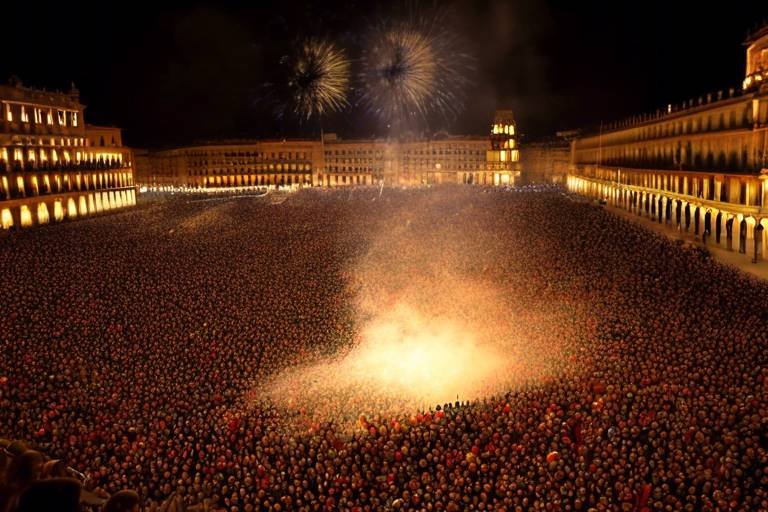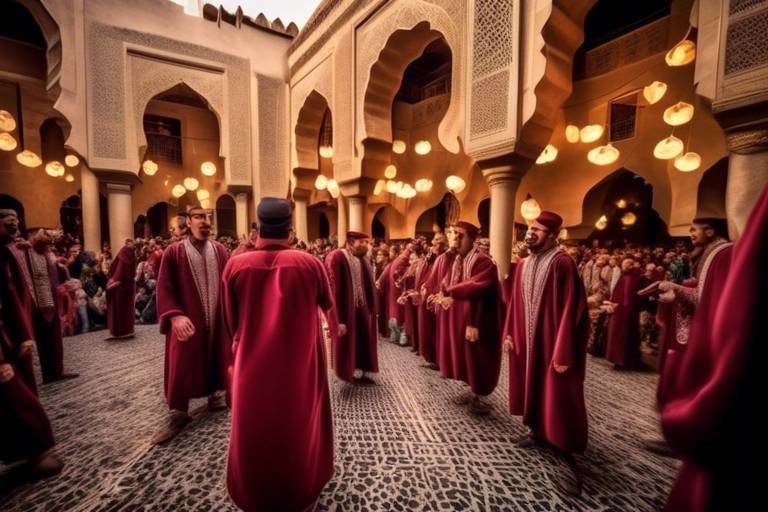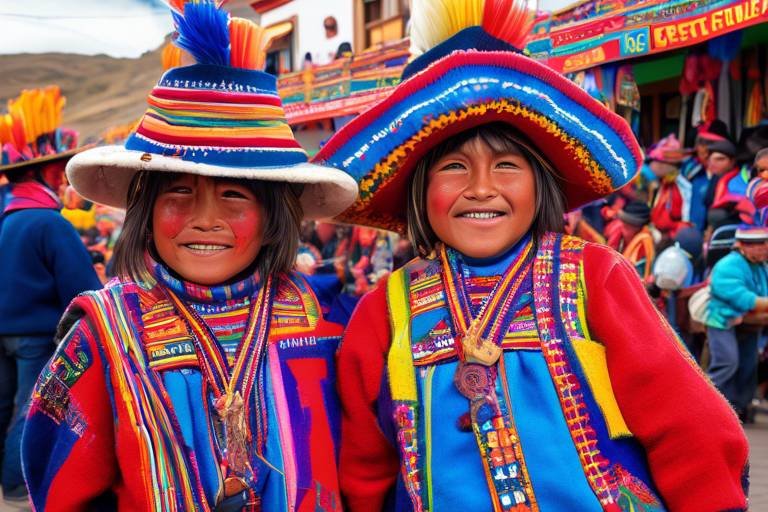Punakha Festival - Bhutan's Living Culture
The Punakha Festival, also known as the Punakha Tshechu, is a vibrant and colorful celebration deeply rooted in Bhutanese culture. This annual event holds great significance for the people of Bhutan, showcasing their rich traditions and spiritual beliefs through a series of elaborate ceremonies and performances.

History of Punakha Festival
The Punakha Festival, also known as the Punakha Tshechu, is a vibrant celebration deeply rooted in Bhutanese culture, showcasing the rich heritage and traditions of the country. This annual festival holds great historical significance and plays a crucial role in preserving Bhutan's living culture for future generations to experience and cherish.
The history of the Punakha Festival dates back centuries, originating from the time of Zhabdrung Ngawang Namgyal, the unifier of Bhutan as a nation. It was during his reign in the 17th century that the Punakha Dzong, a majestic fortress-monastery, was constructed, becoming the backdrop for the grand festivities of the Punakha Tshechu.
The festival is not just a mere display of cultural performances but a sacred event that commemorates the victory of Bhutanese forces over Tibetan invaders. The religious significance intertwined with the historical context adds depth and meaning to the elaborate ceremonies and rituals that take place during the festival.
Throughout the years, the Punakha Festival has evolved, incorporating elements of both tradition and innovation to keep the celebrations dynamic and engaging. It serves as a testament to Bhutan's enduring cultural identity and serves as a platform for communities to come together in a spirit of unity and joy.
As visitors from around the world flock to witness the splendor of the Punakha Tshechu, the festival not only promotes tourism but also contributes to the local economy, supporting businesses and artisans who play a vital role in sustaining Bhutan's cultural heritage.
The Punakha Festival stands as a symbol of resilience against modern influences, with ongoing efforts to preserve its authenticity and traditional practices. Despite the challenges posed by globalization, the festival continues to thrive, adapting to changing times while staying true to its roots.
Looking ahead, the future of the Punakha Festival presents both opportunities and challenges as Bhutan navigates the complexities of a rapidly changing world. The festival's ability to evolve while staying grounded in its cultural values will be key to its continued success and relevance in the years to come.

Traditional Dances and Costumes
Traditional Dances and Costumes are the heart and soul of the Punakha Festival, offering a visual feast of colors and movements that captivate both participants and spectators alike. The dances performed during the festival are deeply rooted in Bhutanese culture and history, each telling a unique story through intricate choreography and symbolic gestures.
The costumes worn by the dancers are a reflection of Bhutan's rich heritage, adorned with vibrant hues, intricate patterns, and elaborate accessories. These traditional garments not only add to the visual spectacle of the dances but also hold significant cultural and spiritual symbolism, representing different aspects of Bhutanese identity and beliefs.
One of the most iconic dances showcased during the Punakha Festival is the Cham Dance, a sacred ritual performance that embodies the essence of Bhutanese religious traditions. Dancers don elaborate masks and costumes, embodying deities, demons, and mythical beings as they move in rhythmic harmony to the beat of traditional music.
Another highlight of the festival is the Tashi Labey dance, a lively and energetic performance that celebrates prosperity and good fortune. Dancers clad in colorful attire twirl and leap with grace and precision, symbolizing the abundance and blessings that the community wishes to attract.
Throughout the festival, spectators are treated to a mesmerizing display of cultural heritage and artistic expression, as dancers of all ages showcase their skills and passion for preserving Bhutan's traditional dances and costumes. The intricate movements, intricate costumes, and vibrant energy of the performances create an immersive experience that transports viewers to a world of ancient traditions and timeless beauty.

Religious Ceremonies and Rituals
Religious ceremonies and rituals hold a significant place in the heart of the Punakha Festival, symbolizing the spiritual essence of Bhutanese culture. The festival is deeply rooted in Buddhist traditions, with monks playing a central role in the religious proceedings. During the event, elaborate rituals are performed to honor Guru Rinpoche, the revered saint who brought Buddhism to Bhutan.
One of the most sacred rituals is the unfurling of the sacred Thongdrol, a massive silk appliqué thangka depicting Guru Rinpoche. This act is believed to bestow blessings upon all who witness it, and devotees flock to receive the blessings of the thangka as it is unveiled. The masked dances or 'Cham' are another integral part of the religious ceremonies, with performers donning vibrant costumes and intricate masks to enact stories from Buddhist mythology.
Throughout the festival, butter lamp offerings are made, symbolizing the dispelling of darkness and ignorance. The lighting of butter lamps is a gesture of reverence and signifies the offering of light to illuminate the path towards enlightenment. Prayer flag hoisting is also a common ritual, where colorful flags inscribed with prayers and mantras are hung to spread blessings and positive energy.
The chanting of sacred mantras fills the air, creating a meditative atmosphere that resonates with spiritual energy. Monks recite prayers and mantras, invoking blessings and protection for all beings. The sound of traditional instruments like drums, cymbals, and horns accompanies the rituals, adding a mystical aura to the ceremonies.

Community Participation and Festivities
Community participation is at the heart of the Punakha Festival, with locals and visitors coming together to partake in the joyous festivities. The vibrant atmosphere is palpable as people of all ages join in the celebrations, creating a sense of unity and camaraderie. From traditional dances to religious rituals, the community actively engages in every aspect of the festival, showcasing their cultural pride and heritage.
One of the most anticipated events during the festival is the grand procession, where residents from surrounding villages gather to witness the colorful display of Bhutanese traditions. The streets come alive with music, dance, and elaborate costumes, reflecting the rich cultural tapestry of the region. It's a time for people to connect, share stories, and revel in the shared experience of celebrating their heritage.
Community members play a vital role in organizing the various activities and events that take place during the Punakha Festival. From preparing traditional dishes to decorating the venues, everyone pitches in to ensure the smooth running of the festivities. The spirit of collaboration and cooperation shines through, creating a sense of belonging and togetherness among participants.
As the festival unfolds, the spirit of community participation extends beyond the locals to include visitors from around the world. Tourists are welcomed with open arms, invited to immerse themselves in the cultural extravaganza and experience the warmth and hospitality of the Bhutanese people. It's a time of cultural exchange and mutual respect, where boundaries blur and connections are forged through shared experiences.

Symbolism and Cultural Significance
The Punakha Festival in Bhutan is a vibrant celebration deeply rooted in the country's rich cultural heritage, symbolizing much more than just a yearly event. This festival holds immense that reflects the values and beliefs of Bhutanese society. Each element of the festival, from the traditional dances to the religious rituals, carries a profound meaning that resonates with the Bhutanese people and visitors alike.
One of the key symbolic aspects of the Punakha Festival is the traditional dances performed during the event. These dances are not merely for entertainment but serve as a form of storytelling, conveying tales of ancient legends, myths, and historical events. The intricate movements and colorful costumes worn by the performers hold deep cultural meanings, representing various deities, animals, and elements of nature.
Moreover, the religious ceremonies conducted as part of the festival are integral to its cultural significance. These rituals are steeped in spiritual beliefs and traditions, aiming to invoke blessings, ward off evil spirits, and promote harmony and prosperity within the community. The chanting of sacred mantras, offering of prayers, and symbolic gestures all contribute to the spiritual essence of the Punakha Festival.
Another important symbol of the festival is the unity and community participation it fosters among the Bhutanese people. The coming together of locals and visitors in joyous celebration not only strengthens social bonds but also reinforces a sense of cultural identity and pride. The festive atmosphere that envelops the festival grounds creates a shared experience that transcends individual differences and unites people in a common celebration of Bhutanese culture.
Furthermore, the cultural significance of the Punakha Festival lies in its role as a living testament to Bhutan's heritage and traditions. As modern influences continue to shape the world, efforts to preserve the authenticity of this cultural event become increasingly crucial. By upholding the customs, rituals, and values embodied in the festival, Bhutan strives to safeguard its unique cultural identity and pass it on to future generations.

Impact on Tourism and Economy
When it comes to the Punakha Festival, its impact extends beyond just cultural significance. This vibrant celebration plays a crucial role in boosting tourism and stimulating the local economy of Bhutan. Each year, thousands of visitors from around the globe flock to witness the colorful festivities and immerse themselves in the rich traditions of the festival.
The influx of tourists during the Punakha Festival brings about a surge in economic activities in the region. Local businesses, including hotels, restaurants, and souvenir shops, experience a significant increase in revenue as they cater to the needs of the visiting crowds. The demand for accommodations and services creates employment opportunities for the local population, further contributing to the economic growth of the area.
Moreover, the rise in tourism during the Punakha Festival helps promote Bhutan as a prime travel destination, attracting more visitors throughout the year. The festival serves as a showcase of Bhutanese culture and traditions, captivating the hearts of travelers and encouraging them to explore other aspects of the country beyond the festivities.
From a broader perspective, the economic impact of the Punakha Festival ripples through various sectors, including transportation, handicrafts, and cultural experiences. The festival serves as a catalyst for the growth of the tourism industry in Bhutan, positioning the country as a unique and culturally rich destination on the global map.

Preservation Efforts and Modern Influences
Preserving the authenticity of the Punakha Festival is a paramount endeavor in the face of modern influences that threaten to dilute its cultural significance. Efforts to safeguard this living tradition involve a delicate balance between honoring the past and embracing the future. By meticulously documenting the intricate details of the festival's rituals, dances, and costumes, Bhutanese authorities strive to maintain its original essence. Additionally, strict regulations are imposed to ensure that external influences do not overshadow the traditional practices that define the festival.
Modern influences, such as technological advancements and globalization, present both challenges and opportunities for the preservation of the Punakha Festival. While these influences may introduce new elements to the celebration, there is a constant need to evaluate their impact on the festival's core values. Striking a harmonious chord between tradition and modernity is essential to sustain the cultural integrity of this vibrant event. By embracing innovation without compromising authenticity, the Punakha Festival can evolve organically while staying true to its roots.

Future Prospects and Challenges
Looking ahead, the Punakha Festival faces both exciting prospects and significant challenges as it navigates the evolving landscape of Bhutan's cultural heritage. One of the key future prospects lies in the festival's potential to further boost tourism and economic growth in the region. As more travelers seek authentic cultural experiences, the Punakha Festival stands out as a unique attraction that can draw visitors from around the globe.
However, with increased attention and participation comes the challenge of preserving the festival's traditional essence amidst modern influences. As Bhutan opens up to the world and embraces technological advancements, there is a risk of diluting the authenticity of the Punakha Festival. Balancing the need for innovation and preservation will be crucial in ensuring that the festival continues to hold its cultural significance for generations to come.
Furthermore, as Bhutan's society undergoes social and economic changes, there is a need to adapt the Punakha Festival to reflect contemporary values while staying true to its roots. This delicate balance between tradition and modernity poses a challenge for organizers and participants alike, requiring thoughtful planning and creative solutions to sustain the festival's relevance in a rapidly changing world.
In the face of these prospects and challenges, the future of the Punakha Festival hinges on the collective effort of the Bhutanese community, government, and cultural institutions to safeguard and promote this vibrant celebration of living culture. By embracing innovation while upholding tradition, the Punakha Festival can continue to thrive as a symbol of Bhutan's rich heritage and enduring spirit.
Frequently Asked Questions
- What is the significance of the Punakha Festival?
The Punakha Festival holds great cultural and religious significance in Bhutan. It commemorates the victory of Bhutanese forces over Tibetan invaders and serves as a symbol of unity and spiritual devotion.
- What can visitors expect to see at the Punakha Festival?
Visitors can witness a vibrant display of traditional dances, colorful costumes, religious rituals, and community festivities. The festival offers a unique opportunity to immerse in Bhutanese culture and witness its living heritage.
- How does the Punakha Festival impact tourism in Bhutan?
The Punakha Festival attracts a large number of tourists from around the world, contributing significantly to Bhutan's tourism industry. It not only promotes cultural exchange but also boosts the local economy through increased visitor spending.
- Are there any efforts to preserve the authenticity of the Punakha Festival?
Yes, there are ongoing efforts to preserve the authenticity of the Punakha Festival amidst modern influences. Various initiatives are in place to safeguard the traditional practices and cultural heritage associated with the festival.
- What are the future prospects and challenges facing the Punakha Festival?
The Punakha Festival faces the challenge of balancing tradition with modernity as Bhutan's cultural landscape evolves. The festival's future prospects depend on the ability to adapt to changing times while staying true to its roots.



















